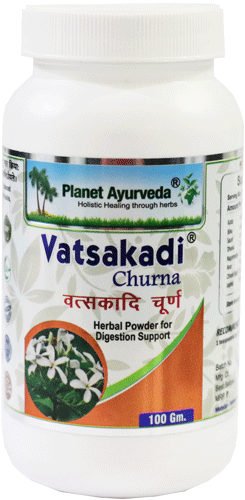Vatsakadi Churna- Uses, Dose, Ingredients, and Side Effects
There are many conditions which are related to the intestines or to our whole Gastrointestinal system. Every condition impacts this system differently. The GI tract is the sthana or Adhisthana of pitta dosha and its imbalance is responsible for many conditions arising related to pitta Adhisthana. Pitta dosha represents the fire element in the body. A specific type of pitta dosha is situated in our GI tract which helps in absorption, digestion and metabolism of the food we eat. Vatsakadi churna helps in bringing back that balance and has really great results.
Symptoms of pitta imbalance
- Intestinal inflammation
- Burning in stomach
- Ulcers in stomach or intestines
- Increased stool frequency
- Constipation
- Burning sensation while passing stool
- Heartburn
- Pain in abdomen
- Fluctuating blood pressure
- Irritability and anger
- Indigestion
- Sulphur Burps
Vatsakadi uses, dose, ingredients and side effects:
Vatsakadi is an Ayurvedic formulation which is available in the market in the form of churna or powder. The formulation is prepared or manufactured by Planet Ayurveda and is effective to balance pitta dosha. The vatsakadi churna is really great as it also possesses healing properties which help in healing ulcers, protects the intestinal mucosa from erosion and has a great effect on increased motion frequency. The remedy or herbal formulation is free from different types of chemicals such as flavouring agents, colouring agents and sweetening agents. Moreover, the formulation does not have any kind of additives and preservatives. This formulation is very safe to consume and is free from adverse effects.
Product category
Poly herbal powder
Product description
- The formulation is totally herbal
- Aids balancing of pitta in the GI tract
- Promotes healing
- Soothes intestinal mucosa
- Maintains healthy digestion
- 100% natural and authentic product
Main Ingredients
Ingredients of vatsakadi Churna
- Kutaj (Holarrhena antidyssentrica)
- Bilva (Aegle marmelos)


Description of herbs
1. Kutaj (Holarrhena antidyssentrica)
Kutaj (Holarrhena antidysenterica) is kept under Kutaja kula and belongs to the Apocynaceae family. The English name for Kutaj is kurchi and in Sanskrit it is called kutaja, shakra, vatsaka and koti. Conessine, which is a steroid alkaloid found in apocynaceae family plants. It bears antibacterial and anti-inflammatory Properties and maintains natural flora of the intestine. In addition it also acts as an H3 receptor antagonist. In Ayurveda it is described that kutaja is having healing properties and is very well potential in pacifying pitta dosha. It has ruksha guna, tikta and kashaya rasa along with katu vipaka. Kutaja acts as a deepena herb which means it increases the weak digestive fire and thus helps in getting rid of parasitic infection. It also helps in reducing any internal intestinal swelling.
2. Bilva (Aegle marmelos)
Aegle or bilva is a herb kept under shothahara gana which means it is potent enough to alleviate any kind of swelling. The family of bilva is Rutaceae and it is called Bengal quince in English language. In Sanskrit the bilva is known as shalatu, which means unripe. Another name given to this herb is shalya which means having thorns, hridya gandha, a specific odour of leafs and fruit, shiva druma, it is loving to god shiva, trishikha, has three leaves and also called as duraroha, the tree cannot be climbed due to thorns. About properties, it has dry and light inherent properties, kashaya (astringent) and tikta (bitter) taste along with ushna (hot) potency and katu (pungent) post digestion taste. The herb is kapha shamak by laghu guna, kashaya and katu rasa and is vata shamak due to ushna property or hot property. The herb is very beneficial as a tranquilliser and is used in vata disorders extensively. The unripe fruit of bilva is an appetiser, digestant and astringent in taste.
Indications
- Balances pitta dosha
- Keeps intestinal mucosa healthy
- Maintains healthy intestinal flora
- Reduces loose stools or increased stool frequency (Diarrhoea and dysentery)
- Have healing effect on intestinal lining
Dosage
Dosage and Adjuvants of vatsakadi churna: Half tsp twice daily after meals with lukewarm water Or as directed by the doctors
Side effects and package
- There are no recorded side effects of vatsakadi churna
- It should be taken under proper supervision of a physician.
Presentation
Jar pack of weight 100gm with equal quantity of churna.
Availability of vatsakadi churna
Vatsakadi churna of Planet Ayurveda is available in almost all the cities and towns of India. This product is also available in many other countries such as Canada, Singapore, Australia and The USA.
In a nutshell, it can be concluded that Vatsakadi churna is the best remedy to take for Ulcerative colitis. So you can take this formulation and for further queries you can mail us on herbalremedies123@yahoo.com
Dr. Vikram Chauhan
Latest posts by Dr. Vikram Chauhan (see all)
- Best Herbs That Kill Cancer Cells - December 12, 2023
- How to treat optic neuritis in ayurveda with herbal remedies - December 11, 2023
- Treatment of Sarcoidosis in Ayurveda with Herbal Remedies - November 20, 2023
- Vibhitaki/Baheda (Terminalia bellirica)- Benefits, Medicinal Uses, Dosage & More - November 18, 2023
- Chylous Ascites Causes Symptoms and Treatment in Ayurveda - October 4, 2023




